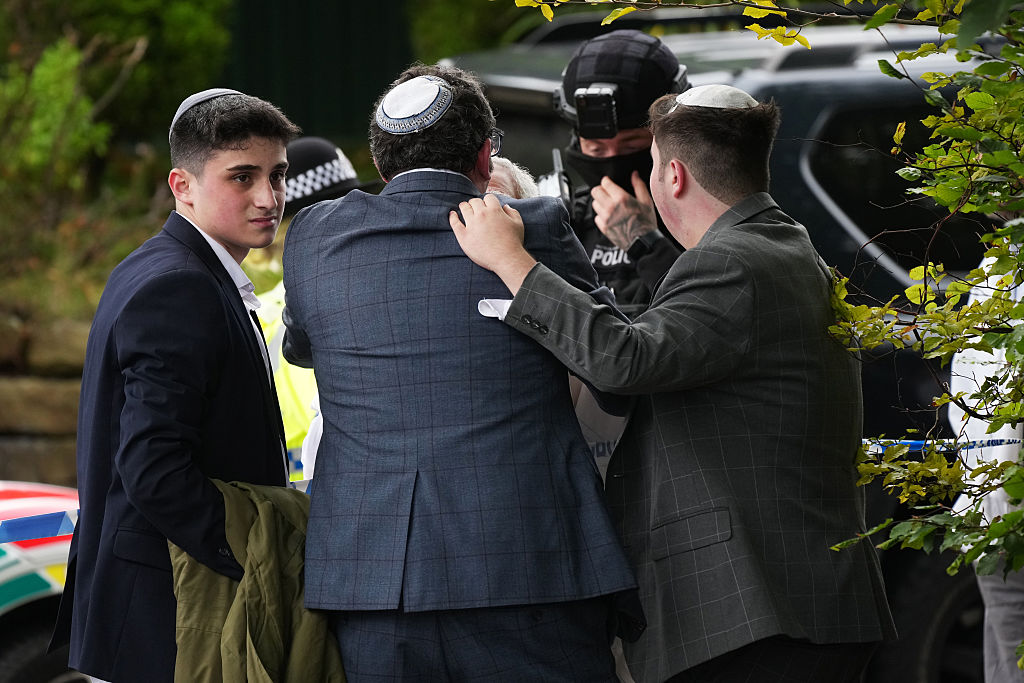The atrocious attack on a community of peaceful Jewish worshippers at a synagogue in Manchester yesterday shocked us all. But it was also the predictable outcome of converging trends that British society has either ignored or failed to stop.
Since 7 October 2023, extremist organisations such as Isis and al Qaeda have repeatedly called for violence against Jewish communities in Europe. Isis even published an article called ‘Practical steps to fight the Jews’ in its al-Naba outlet that encouraged attacks on synagogues in Europe.
This is not passive propaganda but a deliberate framing of Jewish people as complicit in foreign conflicts, followed by explicit calls for violence – often by lone actors who are far harder to detect.
These messages do not circulate in a vacuum.
They are amplified by algorithms that feed on outrage. Social media platforms, encrypted apps and fringe forums funnel this material into feeds, promoted by self-styled analysts who recycle age-old conspiracy theories. My Instagram feed was filled with videos of children dressed as Hamas fighters and others chanting anti-Jewish slogans – including ‘Khayber Khayber Ya Yehud, jaish Mohammad sawf ya’ud’, a call for the beheading of Jews – these began appearing shortly after 7 October.
The result is an environment where prejudice is normalised, nuance is lost and communities are torn apart. Anti-Semitic incidents in the UK have soared: the Community Security Trust reported 5,583 anti-Jewish incidents between October 2023 and September 2024 – an all-time high.
Abusive behaviour, threats, assaults and property damage have all increased. In the first six months of 2024 alone, 1,978 incidents were logged, double the figure for the same period in 2023.
The Manchester attack fits this pattern: anti-Semitism driven by geopolitical flashpoints, extremist ideology and online radicalisation combining to produce violence.
Compounding the danger is weak social cohesion in many towns and cities. Opportunities for genuine interaction between people from different backgrounds are scarce. Without that humanisation, suspicion festers, grievances deepen, echo chambers form – and conspiratorial hate takes root.
So how do we fix this?
First, we must separate anti-Semitism from foreign conflicts. This should be the default stance in our public life. International events matter, but the moment we suggest Jewish citizens here are responsible for the actions of states abroad, we legitimise hate. Politicians, community leaders and the media must refuse to play along.
Second, we need to invest in social cohesion. This means supporting projects that bring people together in a shared activity where real understanding can take place. It means schools teaching religious literacy, the history of Jewish communities in Britain and the dangers of prejudice in all its forms. Not just tolerance, but comprehension. Yet despite this, cohesion does not appear to be a priority at a local level, judging by funding allocation.
Third, local hate-crime strategies need serious investment. That means not only funding but visible commitment from local authorities, police and community organisations to raise awareness, ensure accessible reporting, protect those who come forward and deliver action rather than rhetoric. The majority of the cases I worked on in Prevent featured an aspect of anti-Semitism, regardless of the type of radicalisation, showing how hatred of Jews is so deeply entrenched in online extremist discourse.
‘These systems actively amplify extreme material, creating digital echo chambers in which vulnerable individuals are fed a steady diet of anger, misinformation and division.’
Fourth, Big Tech must be held to account not just for content but for algorithms that privilege outrage. These systems actively amplify extreme material, creating digital echo chambers in which vulnerable individuals are fed a steady diet of anger, misinformation and division. I have experienced this myself on many occasions, including straight after 7 October when my feed was flooded with pro-Hamas content. And I have managed cases where a young children have been radicalised from their bedrooms. This is a real crisis in our society that is not talked about often enough, as governments are distracted with conversations about content moderation – which is effectively an unwinnable game of whack-a-mole.
Finally, we need more public solidarity. When attacks like this happen, communities must stand together – Jews, Muslims, Christians and others – to reject hate and division. Only together can we reaffirm what Britain should be: safe, plural and open.
The Manchester attack is a tragedy. It should shame us into asking how we allowed this to unfold in plain sight. But it must also be the catalyst to repair fragile social bonds, strengthen integration and confront hatred. If we fail, we will sleepwalk into a dystopian future in which no one feels safe.
Ghaffar Hussain is a former Prevent counter-terror officer







Comments